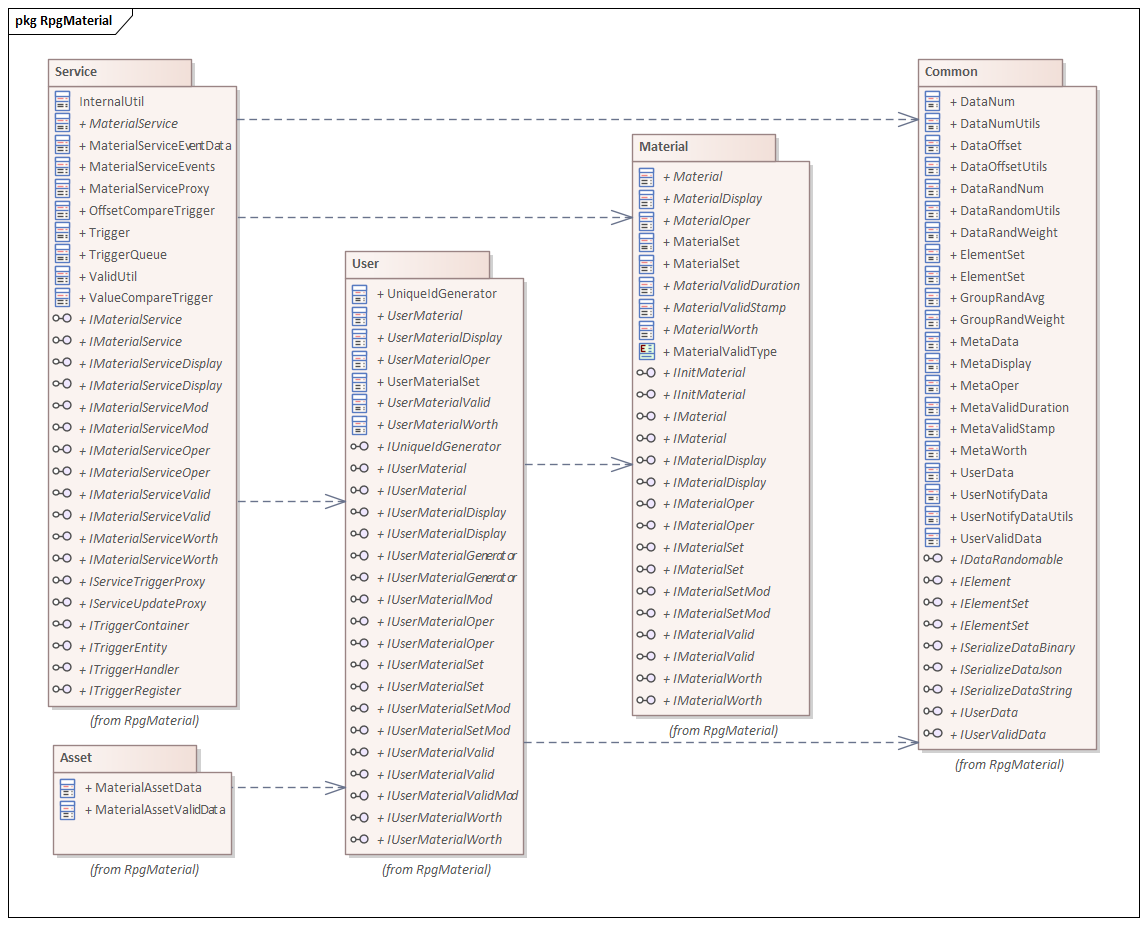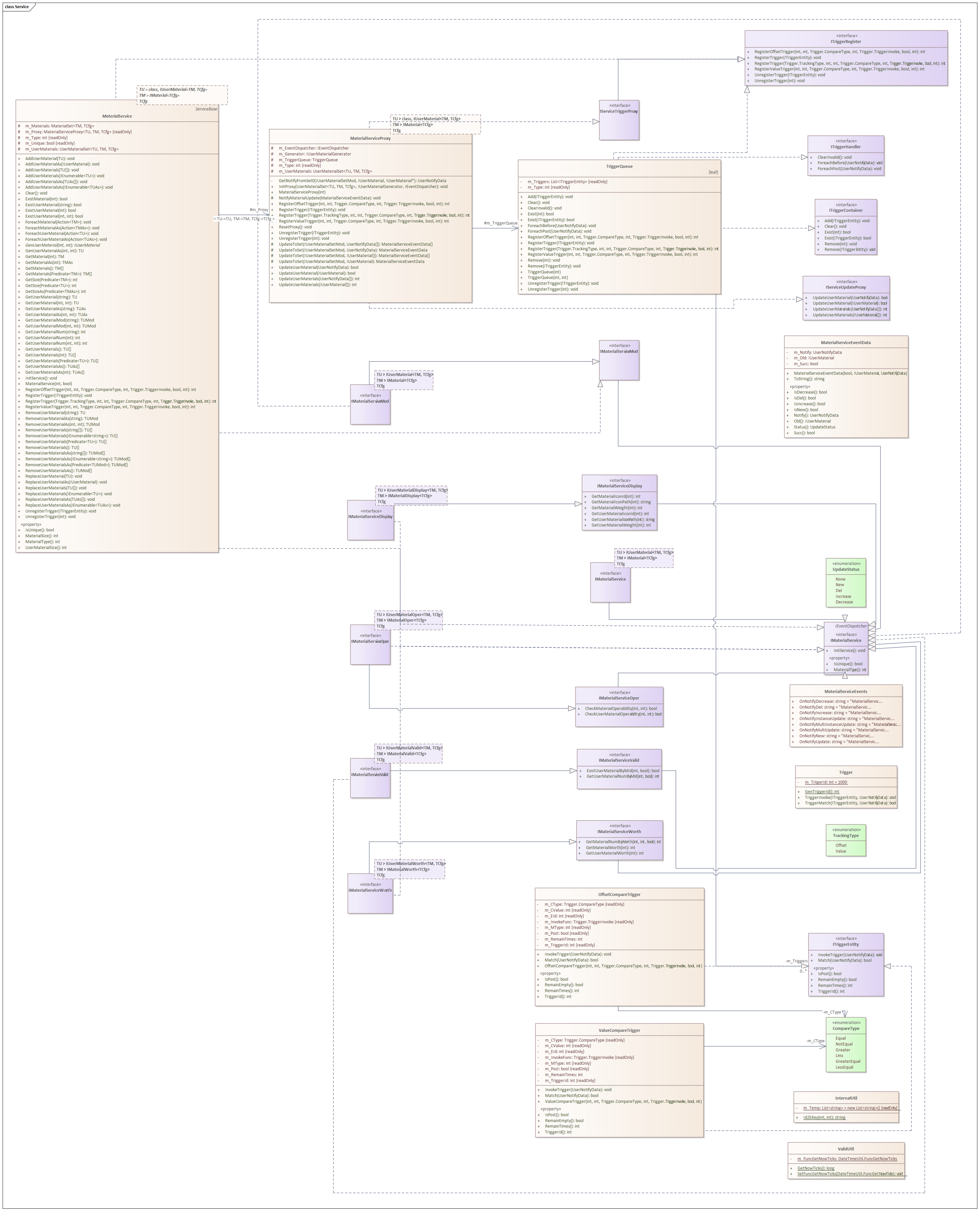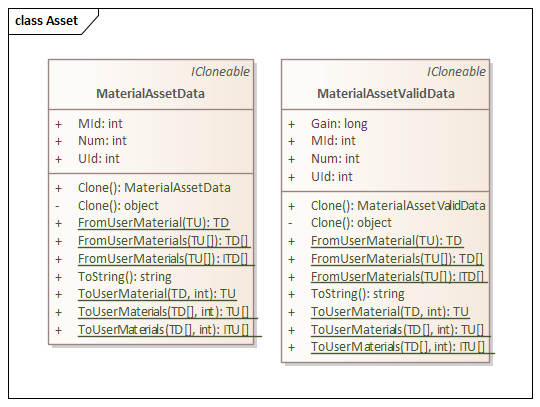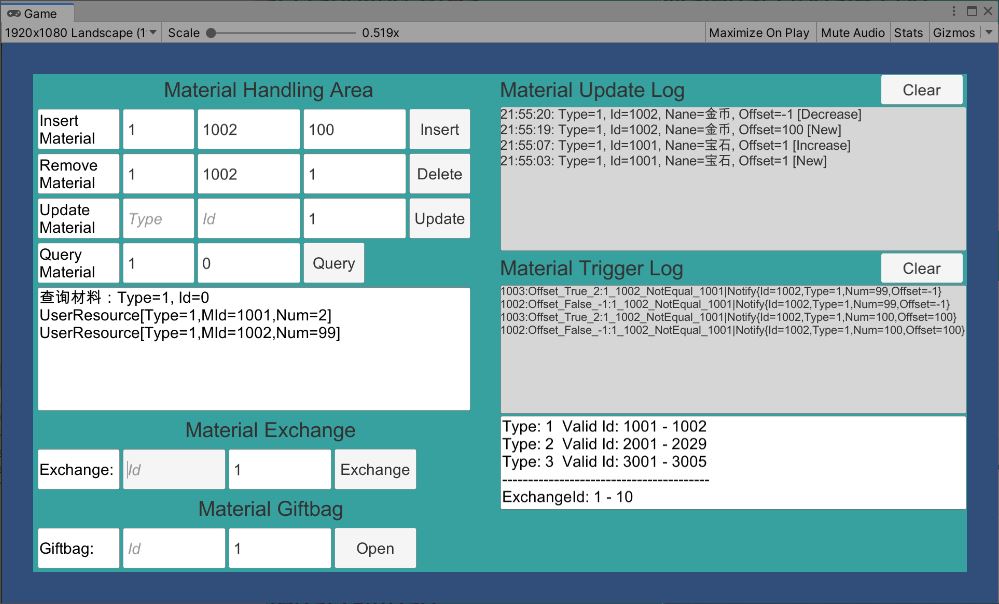中文 | English
RocketDriver Pro

RocketDriver Pro is a game framework for Unity engine
8. Rpg Material Data System
This is a general game data management system.
The player’s numerical data is managed in the form of KTV (Key-Type-Value).
- JLGames.RocketDriver.Games.RpgMaterial
Provides functional support for the Rpg material data system. The dependencies are as follows:

- JLGames.RocketDriver.Games.RpgMaterial.Common The basic data structure of the system.
- JLGames.RocketDriver.Games.RpgMaterial.Material A data structure in the system about material definitions.
- JLGames.RocketDriver.Games.RpgMaterial.User The data structure in the system about user data storage.
- JLGames.RocketDriver.Games.RpgMaterial.Service The data structure in the system that provides external interface support.
- JLGames.RocketDriver.Games.RpgMaterial.Asset The data structure in the system that is serialized for Unity.
8.1 Design Ideas
- Metadata (configuration data) of user data is managed in KTD(Key-Type-Define) format.
- The source of metadata (configuration data) can be derived from value table export, server acquisition, asset configuration, etc.
- Through KT(Key&Type), the metadata (configuration data) definition (Define) can be obtained, and the validity can be checked when the user data is set.
- User data is managed in KTV(Key-Type-Value) format (memory, local file, server, etc.).
- Under the same metadata definition, if multiple pieces of user data are required, they will be saved in the form of KTUV(Key-Type-UId-Value), which is compatible with both common data formats and multiple pieces of data. Require.
- User data (Value) usually uses basic numerical types to meet the needs, of course, game designers can expand the storage structure of data.
- Through KT(Key&Type) or KTU(Key&Type&UId), the player’s specific data (Value) can be obtained for calculation and display.
- Changes to user data are issued in the form of notifications, supporting both incremental changes and direct updates.
8.1.1 Common module design instructions
- Provides basic management functions of data objects and defines the most basic interface of data objects.
- Provide the most basic configuration data interface definition and related data structure implementation.
- Provide the most basic user data interface definition and related data structure implementation.
- Provides optional extension interface definition.
- Provides data structure implementations for basic computations.

8.1.1.1 Common interface design
- IElement Data Object Base Interface
- IElementSet Data collection base interface for managing IElement objects.
- IUserData、IUserData、IUserValidData、IUserValidData1 User data related interface.
- ISerializeDataBinary, ISerializeDataJson and ISerializeDataString Data serialization related interface.
- IDataRandomable Number of random related interfaces.
8.1.1.2 Common data structure design
-
ElementSet The implementation class of IElementSet provides management functions for IElement objects, which can be used for inheritance or combination.
- Configuration data related data structures
- MetaData Configuration data base, including Id, name, type, size constraint, description.
- MetaDisplay Configuration data displays related data, including icon ID 、 display weight and display quality .
- MetaOper
Configuration data manipulation behavior settings, including bit-wise defined values.
Operation behavior settings:- Assume that the 1st bit of the binary is defined as usable and the 2nd bit is defined as discardable.
- When the value is binary (11), it means that the data definition can be used or discarded.
- MetaWorth
Configure data value to define relevant data, including value.
Value Definition:- The marked unit price of the type market item.
- For quantity comparison and calculation between different configurations.
- MetaValidDuration Configure the data related to the validity period of the data.。
- MetaValidStamp Configuration data valid time interval related data。
- User data related data structures
- UserData User data base, including Id (corresponding to the Id of MetaData), type (corresponding to the type of MetaData), quantity
- UserData1 Inherited from UserData, add the unique Id property.
- UserValidData Inherited from UserData, adding the timestamp attribute,
- UserValidData1 Inherited from UserValidData, add the unique Id property.
- Calculate and notify related data structures
- DataNum
- Id, type Used to locate configuration data items and user data items
- quantity Used to override the quantity in the user data item
- DataOffset
- Id, type Used to locate configuration data items and user data items
- offset value Used to add to the quantity in the user data item, the result overwrites the quantity in the user data item
- UserNotifyData After updating the user data through the DataNum and DataOffset data, the UserNotifyData result can be calculated to notify the front-end display effect.
- DataNum
- random correlation data structure
- DataRandNum Randomize the mean between the minimum and maximum values.
- DataRandWeight There are only two results, true and false, for the random weights.
- GroupRandAvg Random one of multiple values, with average probability.
- GroupRandWeight Random one of multiple values, the probability depends on the weight.
8.1.1.3 Common tool class design
- DataNumUtils Behavior logic related to DataNum
- DataOffsetUtils Behavior logic related to DataOffset
- UserNotifyDataUtils Behavior logic related to UserNotifyData
- DataRandomUtils Random logic for the class implementing the IDataRandomable interface
8.1.2 Material Module Design Instructions
- Provides common interface definitions and related implementations for configuration data.
- Combination of interfaces and data structures in Common.

8.1.2.1 Material interface design
- IMaterial Inherited from IElement and defines common properties and functions of configuration data.
- IMaterialDisplay Inherited from IMaterial, it further defines the properties and functions of configuration data with display function.
- IMaterialOper Inherited from IMaterial, it further defines the properties and functions of configuration data with operational behavior.
- IMaterialWorth Inherited from IMaterial, it further defines the properties and functions of the configuration data with valuable definitions.
- IMaterialValid Inherited from IMaterial, it further defines the properties and functions of time-tested configuration data.
- IMaterialSet Inherited from IElementSet and defines common functions for configuring data collections.
- IInitMaterial, IInitMaterial<TCfg> Defines the initialization logic interface for configuration data.
8.1.2.2 Material data structure design
Note: The logical implementation of the following data structure depends on the array structure in Common, and the usage method is combination.
- Material An abstract class that implements IMaterial, implements some functions, and subclasses can override behavior.
- MaterialDisplay The abstract class that implements IMaterialDisplay implements some functions, and subclasses can override the behavior.
- MaterialOper The abstract class that implements IMaterialOper, implements some functions, and subclasses can override the behavior.
- MaterialWorth An abstract class that implements IMaterialWorth, implements some functions, and subclasses can override the behavior.
- MaterialValidDuration An abstract class that implements IMaterialValid, implements some functions, and subclasses can override the behavior.
- MaterialValidStamp An abstract class that implements IMaterialValid, implements some functions, and subclasses can override the behavior.
8.1.3 User module design description
- Provides normal user data functions.
- Provides user data function with unique Id.
- Provides functionality for managing user data collections.

8.1.3.1 User interface design
- IUserMaterial and IUserMaterial1
- IUserMaterial Inherited from IElement, defines the properties and functions of user data.
- IUserMaterial1 Inherited from IUserMaterial, adding a unique Id property.
- IUserMaterialDisplay and IUserMaterialDisplay1
- IUserMaterialDisplay Inherited from IUserMaterial, adding properties and functions related to the display function.
- IUserMaterialDisplay1 Inherited from IUserMaterialDisplay, adding the property of Unique Id.
- IUserMaterialOper and IUserMaterialOper1
- IUserMaterialOper Inherited from IUserMaterial, adding properties and functions related to operation behavior.
- IUserMaterialOper1 Inherited from IUserMaterialDisplay, adding the property of Unique Id.
- IUserMaterialWorth and IUserMaterialWorth1
- IUserMaterialWorth Inherited from IUserMaterial, adding value-related properties and functions.
- IUserMaterialWorth1 Inherited from IUserMaterialWorth, adding the unique Id attribute.
- IUserMaterialValid and IUserMaterialValid1
- IUserMaterialValid Inherited from IUserMaterial, adding properties and functions related to time inspection.
- IUserMaterialValid1 Inherited from IUserMaterialValid, the unique Id property is added.
- IUserMaterialMod and IUserMaterialMod1
- IUserMaterialMod Define the modification interface of user data
- IUserMaterialMod1 Inherited from IUserMaterialMod, a unique Id attribute modification interface is added.
- IUserMaterialValidMod and IUserMaterialValidMod1
- IUserMaterialValidMod Inherited from IUserMaterialMod, added the user to obtain the timestamp modification interface
- IUserMaterialValidMod1 Inherited from IUserMaterialValidMod, the unique Id attribute modification interface is added.
- IUserMaterialSet Define the interface related to reading and searching in the user data collection
- IUserMaterialSetMod Define the interface related to modification in the user data collection
8.1.3.2 User data structure design
Note: The logical implementation of the following data structure depends on the array structure in Common, and the usage method is combination.
- UserMaterial and UserMaterial1
- UserMaterial The abstract class that implements IUserMaterial, implements some functions, and subclasses can override the behavior.
- UserMaterial1 The abstract class that implements IUserMaterial1, implements some functions, and subclasses can override the behavior.
- UserMaterialDisplay and UserMaterialDisplay1
- UserMaterialDisplay The abstract class that implements IUserMaterialDisplay implements some functions, and subclasses can override the behavior.
- UserMaterialDisplay1 The abstract class that implements IUserMaterialDisplay1, implements some functions, and subclasses can override the behavior.
- UserMaterialOper and UserMaterialOper1
- UserMaterialOper The abstract class that implements IUserMaterialOper, implements some functions, and subclasses can override the behavior.
- UserMaterialOper1 The abstract class that implements IUserMaterialWorth1, implements some functions, and subclasses can override the behavior.
- UserMaterialWorth and UserMaterialWorth1
- UserMaterialWorth The abstract class that implements IUserMaterialWorth, implements some functions, and subclasses can override the behavior.
- UserMaterialWorth1 The abstract class that implements IUserMaterialWorth1, implements some functions, and subclasses can override the behavior.
- UserMaterialValid 和 UserMaterialValid1
- UserMaterialValid An abstract class that implements IUserMaterialValid to achieve some functions, and subclasses can override the behavior.
- UserMaterialValid1 The abstract class that implements IUserMaterialValid1, realizes some functions, and subclasses can override the behavior.
- UserMaterialSet The abstract class that implements IUserMaterialSet, implements some functions, and subclasses can override the behavior.
8.1.4 Service Module Design Instructions
- The design of material Service extends the function of Service Framework.
- The classification of the material Service should correspond to the type (referring to the type in the configuration data) one-to-one, that is, a type creates a Service.
- Provides the basic interface definition of Material Service.
- Provides basic interface definitions for displayable materials, actionable materials, and valuable materials.
- Provides a default implementation class of material service, which can be used as needed. Direct modification and inheritance are not recommended.

8.1.4.1 Service interface design
- IMaterialService Basic interface definition for Material Service.
- IMaterialServiceDisplay Displays the basic interface definition of the Material Service.
- IMaterialServiceOper Basic interface definition for the Actionable Material Service.
- IMaterialServiceWorth Basic interface definition for Value Material Service.
- IMaterialServiceValid The basic interface definition of Aging Material Service.
- IMaterialServiceMod Modification-related interface definitions for material services.
8.1.4.2 Service Logic Design
- MaterialService
A default material service implementation class that can be used on demand. Direct modification and inheritance are not recommended.
Internal functions are composed of functional units in User, Material, and Common. - ServiceUtil Provide some basic logic functions related to service.
8.1.5 Asset Module Design Instructions

- MaterialAssetData Serialized structure of material user data, used in Unity panels.
- MaterialAssetData1 Serialized structure of material user data with unique Id for use in Unity panels.
- MaterialAssetValidData Serialized structure of material user data (with acquisition timestamp) for use with Unity panels.
- MaterialAssetValidData1 Serialized structure of material user data (with acquisition timestamp) with unique Id for Unity panels.
8.2 Use
Depends on the service framework(JLGames.RocketDriver.Games.Services), and the specific usage process is consistent with the general service.
8.2.1 Classification of material data
Classify material configuration table data according to business needs
8.2.2 Prepare the interface
Create a service interface for each type of material, at least inherit IInitService, IInitDataService, IMaterialService
- IInitService Used to initialize material configuration data
- IInitDataService
Used to initialize material user data.
User data source:- Server request
- Local cache file
- Other sources
- IMaterialService Provides some material-related properties and functions.
8.2.3 Implementing the interface
Implement the interface created in the previous step.
8.2.4 Configure and initialize according to the service framework process
According to the [Service Framework Description] (Manual_7.Service_en.html#7.4), register, initialize, and call.
8.2.5 Other functions
- By default, an event is thrown when the user data changes. Perform logic processing after data change by listening to corresponding events.
- Supports trigger function by default, and supports trigger execution when user data changes.
8.3 Example
JLGames/RocketDriver/Samples/RpgMaterial

- Example Explanation
- Provides examples of three material types: Resource, Item, and Giftbag.
- An example of the material exchange function is provided.
- Provided an example of opening function of gift bag (Giftbag).